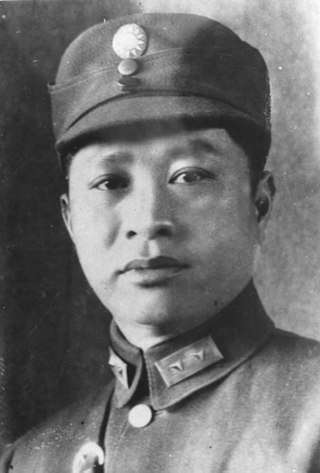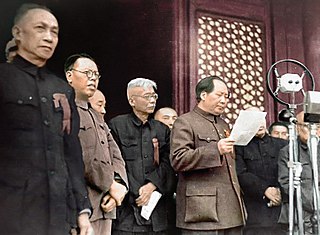Related Research Articles

Yang Shangkun was a Chinese Communist military and political leader, president of the People's Republic of China from 1988 to 1993, and one of the Eight Elders that dominated the party after the death of Mao Zedong.

The Revolutionary Committee of the Chinese Kuomintang (RCCK), also commonly known, especially when referenced historically, as the Left Kuomintang or Left Guomindang, is one of the eight legally recognized minor parties that exist under the direction of the Chinese Communist Party, in the People's Republic of China.

Ye Ting, born in Huiyang, Guangdong, was a Chinese military leader who played a key role in the Northern Expedition to reunify China after the 1911 Revolution. After serving with the Kuomintang, Ye later joined the Communist Party of China (CPC).

The Civil Aviation Administration of China is the Chinese civil aviation authority under the Ministry of Transport. It oversees civil aviation and investigates aviation accidents and incidents.
People's Artist is an honorary title in the Soviet Union, Union republics, in some other Eastern bloc states, as well as in a number of post-Soviet states, modeled after the title of the People's Artist of the USSR.

The politics of Shanghai is structured in a dual party-government system like all other governing institutions in the mainland of the People's Republic of China (PRC). In the last few decades the city has produced many of the country's eventual senior leaders, including Jiang Zemin, Zhu Rongji, Wu Bangguo, Huang Ju, Xi Jinping, Yu Zhengsheng, Han Zheng, and Li Qiang.
The 16th Central Committee of the Chinese Communist Party was in session from 2002 to 2007. It held seven plenary sessions. It was set in motion by the 16th National Congress of the Chinese Communist Party. The 15th Central Committee preceded it. It was followed by the 17th Central Committee of the Chinese Communist Party.
The 15th Central Committee of the Chinese Communist Party was in session from 1997 to 2002. The 14th Central Committee preceded it. It was followed by the 16th Central Committee of the Chinese Communist Party. This was the first Central Committee that current Chinese Paramount Leader Xi Jinping was elected to, as an alternative member.
The 14th Central Committee of the Chinese Communist Party was in session from 1992 to 1997. It held seven plenary sessions. It was preceded by the 13th Central Committee. It was elected by the 14th National Congress of the Chinese Communist Party and in turn elected the 14th Politburo of the Chinese Communist Party.
The 25th Golden Eagle Awards were held September 21, 2010, in Changsha, Hunan province. Nominees and winners are listed below, winners are in bold.

The Two Centenaries is a political slogan that refers to two 100-year anniversaries and a stated set of economic and political goals advanced by General Secretary Xi Jinping following the 18th National Congress of the Chinese Communist Party (CCP) held in 2012. The Chinese government describes the Two Centenaries as the basic foundation for achieving the "Chinese Dream".

The president of the People's Republic of China, commonly called the president of China, is the head of state and the second-highest political office of the People's Republic of China. The presidency on its own is a ceremonial office and has no real power in China's political system. However, the post has been held by the general secretary of the Chinese Communist Party and chairman of the Central Military Commission since 1993, who is China's de facto leader.
The Jiaochangkou incident was a political riot that took place on 10 February 1946 in Jiaochangkou in the centre of Chongqing City, which was the wartime capital of the Republic of China and declared the second capital after the war by the Nationalist -led government. During 1945–46, KMT and the Chinese Communist Party (CCP) held political negotiations over the future of China in the city. The incident marked an open rivalry between the two parties, which eventually led to a civil war that ended up with a CCP victory.

The 50th anniversary of the founding of the People's Republic of China took place on 1 October 1999. A military parade was held in Tiananmen Square in Beijing and various celebrations were conducted all over the country. China's paramount leader Jiang Zemin inspected the troops along Chang'an Avenue in Beijing. This parade was immediately followed by a civilian parade.

The founding of the People's Republic of China was formally proclaimed by Mao Zedong, the Chairman of the Chinese Communist Party (CCP), on October 1, 1949, at 3:00 pm in Tiananmen Square in Beiping, the new capital of China. The formation of the Central People's Government under the leadership of the CCP, the government of the new state, was officially proclaimed during the proclamation speech by the chairman at the founding ceremony.
The People's Armed Police Band is the sole military music unit of the Chinese People's Armed Police (PAP) and one of the four premier military bands in the People's Republic of China. It is currently under the command of the Central Military Commission's Political Work Department and the Political Department of the PAP. It is the sole police band operating in mainland China and it represents the PAP and the Ministry of Public Security at state events.

The National Day Parade, officially the National Day of the People's Republic of China Parade, is a civil-military parade event held at Tiananmen Square in Beijing, the capital of the People's Republic of China, on the National Day of the People's Republic of China on 1 October. It is organized by the People's Liberation Army, the People's Armed Police and the Militia, as well as civilian groups of the Chinese Communist Party (CCP). It has been held every decade since 1959, annually from 1950 to 1959, and has been broadcast live on China Central Television since 1984.
"My People, My Country" is a patriotic lyric song composed by Zhang Li of the Shenyang Conservatory of Music and composed by Qin Yongcheng which debuted in 1985. The lyrics are expressed in the first person, depicting one's love for the motherland. The song was circulated widely after being sung by the famous singer Li Guyi, and remains one of the most popular songs in the country. On the occasion of the 70th anniversary of the founding of the People's Republic of China, "Me and My Motherland" sang all over the country. This song has been shortlisted for 100 patriotic songs recommended by the Central Propaganda Department and 100 excellent songs celebrating the 70th anniversary of the founding of the People's Republic of China.
Li Laizhu was a general (shangjiang) of the People's Liberation Army (PLA). He was a member of the 14th Central Committee of the Chinese Communist Party. He was a delegate to the 7th National People's Congress and a member of the Standing Committee of the 9th National People's Congress.
The 30th anniversary of the founding of the People's Republic of China took place on 29 September 1979. Event was held at the Great Hall of the People in Beijing, the capital of China. Party and state leaders and people from all profession in the capital attended the event. There was no National Day military parade or mass pageant parade in this year.
References
- 1 2 3 4 5 刘诗雨. "1989年9月29日 庆祝中华人民共和国成立40周年". 中国共产党新闻网 (in Chinese (China)). 北京. Archived from the original on 2008-12-30. Retrieved 2017-08-23.
- ↑ 季昃雯. "新聞熱點:盤點中國曆次閱兵式". BBC中文网 (in Chinese (China)). 伦敦. Archived from the original on 2017-08-23. Retrieved 2017-08-23.
- 1 2 徐焰著 (June 2013). 淘尽百战评说古今. 北京:长征出版社. p. 304. ISBN 978-7-80204-797-6.
- ↑ 江泽民. "在庆祝中华人民共和国成立四十周年大会上的讲话" (in Chinese (China)). 北京. Archived from the original on 2022-12-21. Retrieved 2022-12-21.